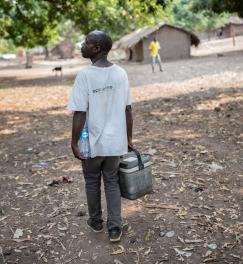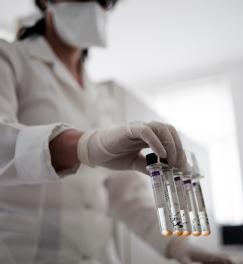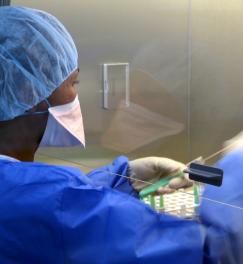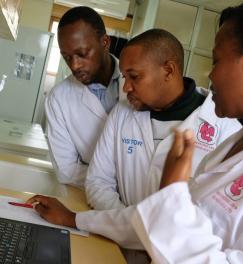Our organisation
Epicentre has 3 research centers - Paris (France), Mbarara (Uganda) and Maradi (Niger), teams of epidemiologists in the field - Mali, DRC, Malawi, Chad, South Sudan, Niger, Uganda - teams delocalized in New York, Dubai, Dakar, Geneva, Brussels, London, Cape Town, a Research Department and an Epidemiology Intervention and Training Department.
Board of Directors
Epicentre has a board consisting of 10 members: four from MSF-Operational Center France, one from MSF WaCA (West and Central Africa), one from MSF-Operational Center Switzerland and four with other relevant experience including the President of the board.
It meets at least twice a year. The board approves the Epicentre budget.
President
- Maryline BONNET - Epidemiological doctor
Vice-President
- Fred EBOKO - Director of Research - IRD, Political Scientist and Sociologist
Treasurer
- Kone Louis PENALI - Medical doctor
Members
- Isabelle DEFOURNY * - Medical doctor and President of MSF France
- Ali OUATTARA * - Medical doctor
- Frédérique DROGOUL * - Medical doctor
- Guillaume LE GALLAIS * - Director of an association
- Philippe SUDRE ** - Medical doctor
- Yap BOUM II *** - Biologist
- Mehul DHORDA - Biologist Researcher
*Representing MSF France Board
**Representing MSF Switzerland Board
*** Representing MSF WaCA Board (MSF Western and Central Africa)
Organisational chart
Epicentre's executive management is composed of the General Director, Klaudia Porten, the Director of the Research Department, Valérie Briand, and the Director of the Epidemiology Intervention and Training Department, Etienne Gignoux. The research activities are based either in Paris (France), Maradi (Niger), Mbarara (Uganda); or decentralized in for example Brussels, Geneva, London, New York, Cape Town, Dakar and Dubaï. Staff can also be based at field locations where there are longer-term projects

Funding
As part of the MSF movement, Epicentre is mostly (about 2/3) funded through MSF’s public fundraising.
Epicentre also collaborates and leads projects aligned with Epicentre’s mission from other sources of funding. Those other funders include the Agence nationale de recherche contre le sida et les hépatites, Drugs for Neglected Diseases initiative, the Wellcome, the Coalition for Epidemic Preparedness Innovations, the European and Developing Countries Clinical Trials Partnership, the London School of Hygiene and Tropical Medicine, the Children’s Investment Fund Foundation...
For the past couple of years Epicentre has an annual budget of over 16 million Euros.
Diversity, Equity, Inclusion: Gender
The success of Epicentre's projects is based on the diversity of professionals with complementary skills. As new challenges arise, Epicentre evolves by integrating new profiles. As new challenges arise, Epicentre evolves by integrating new profiles. This diversity of talent is a reality in all countries where Epicentre is present. It is also reflected in the representation of women and men within Epicentre.
At Epicentre, we are committed to identifying and correcting systemic barriers to professional gender equality. This approach is applied to our three centers and adapted according to the context.
Gender Equality Index
This diversity is reflected in the representation of women and men within Epicentre, which is committed to gender diversity and continues to pursue a policy of professional equality.
Epicentre obtained a score of 89 points out of 100 on the French Equality F/H index in 2023 for its staff under French contract.
For more information
This index evaluates the professional equality between women and men within companies in the form of an overall score out of 100 points, which each company calculates on the basis of the following 4 indicators
- Pay gap between women and men: 39 points obtained/40
- Gap in the proportion of women and men who have had a salary increase: 35 points obtained/35
- Pay rises on returning from maternity leave: 15 points obtained/15
- Number of employees of the underrepresented gender among the top 10 highest earners: 0 point obtained/10 (overrepresentation of women)
Below the 75-point threshold, the company must define and implement corrective measures within three years.
Mission
Find out more
Training
Find out more
Research Center Niger
Find out more
Research Center Uganda
Find out more





